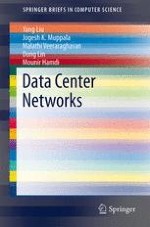This SpringerBrief presents a survey of data center network designs and topologies and compares several properties in order to highlight their advantages and disadvantages. The brief also explores several routing protocols designed for these topologies and compares the basic algorithms to establish connections, the techniques used to gain better performance, and the mechanisms for fault-tolerance. Readers will be equipped to understand how current research on data center networks enables the design of future architectures that can improve performance and dependability of data centers. This concise brief is designed for researchers and practitioners working on data center networks, comparative topologies, fault tolerance routing, and data center management systems. The context provided and information on future directions will also prove valuable for students interested in these topics.
